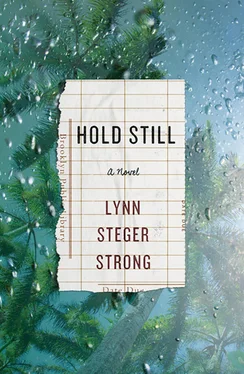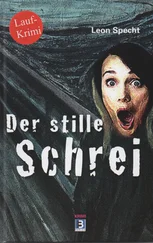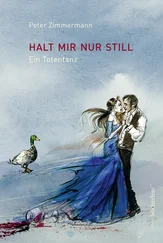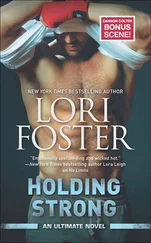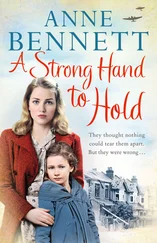“He’s a kid, El.” She wishes her brother were here instead of at his stupid college. Jack would love Ben. Jack might love anyone but her.
“He’s not, though. He’s smarter than me and he hates me. And all he wants is for me to take him back to his mom and dad.”
“You just have to give him things they can’t give him. Take him out. Have fun with him.”
“Oh, please, Benny. He’s not fun. He’s a spoiled little brat.”
“Does he like to swim?”
“It’s been raining. We’ve been trapped inside.”
“That’s not his fault. He’s a kid, El. He’s probably going nuts.”
“I’m going nuts.”
She listens to her brother’s drawn-out sigh. He sounds like her mom when he does this. “Just be good, El. You need to make this work, okay? Somehow. Okay. Just make this work.”
“What did she say?”
“Nothing, El. She’s just exhausted, I think.”
“Just tired of me.”
“Tired of worrying about you.”
“Right.”
Four years before: Ellie walked from the Lower East Side over the Brooklyn Bridge and to the park to watch her brother play soccer. Dylan was pissed. She’d taken both the pills he’d bought, when they’d agreed that they would share.
“Selfish bitch,” he’d called her.
She’d flipped him off. Her arm felt heavy and she’d only lifted it halfway as her middle finger rose toward him. “Fuck you,” she’d mumbled back. She left her backpack and her phone and walked the six miles, three hours, to her brother’s game.
She saw Ben light up when he saw her. She thought he did, then wondered if it was the drugs mixed up with her joy in seeing him. “Benny,” she said, suddenly breathless. Though he was across the field and only smiled and waved.
Her mom was there as well, right by the benches where the team sat. She’d supplied the snacks that week and was collecting granola wrappers as the boys tightened the laces of their cleats, their backs all rounded in a row. Ellie waved to her mom, but stayed far away. She lay down on the grass and felt the prickle of it and the dampness. A couple people turned from the game to watch. The high was drifting slowly from her, but she held tight to it and breathed in and out, marveling at the sweetness of the air.
She turned over on her stomach. She placed her elbows deep into the dirt and kicked up her feet. A whistle blew. It screeched between her ears and she buried her head more deeply in the grass. She got soil, rich, dark-smelling, on her lips and in her nose. And then her brother, running up closer, on the right side of the field. The whistle blew again. The ball was kicked from center field. There was a thwack. And then Ben ran toward it, feet pounding against dirt and grass, legs like long, sinewed sculptures, still-twiggy stretched-out graceful arms.
He came upon the ball, no one close to him, and made easy careful contact. Black white black white black white. She wished that she could hold tight to her brother’s ankle and ride along with him as he ran.
“Benny,” she said again.
She looked over at her mother, who was trying to focus on the game, but her eyes kept wandering to Ellie across the packs of boys in white and blue. Ellie waved to her, smiling. She turned over on her back again and listened to the cheering of the smattering of parents as her brother scored.
Her whole body felt heavy. The walk had been exhausting. She usually liked to lie and stare, walk slowly, watching lights, when she was stoned. And now she was paying for the extreme exertion of her walk. She thought she’d sleep forever, settle slowly into the damp grass.
There was a blank then. She heard pounding, feet against grass and ground, whistles blowing, boys yelling to one another, her brother’s name, she thought, more than once. She held the grass and smelled it. She slept and drifted in and out.
“El,” she heard. The game was over; she saw feet walk past her, sandals, sneakers, a pair of large black steel toes with matching heels. She saw her brother’s cleats and the socks that reached up high to cover his shin guards. They were royal blue with a bright white stripe around the top. She wanted to touch the hairs popping up over the socks with the bottom of her chin and then her cheeks and then her forehead. She wanted to burrow her head back in the grass and go to sleep.
She felt a little nauseous, bleary. “Yeah,” she said.
“Elinor,” said her mother. She leaned over and pulled Ellie up by her arm.
Ellie stared at her. She felt a blank space where the words to answer might have come from.
“Hey,” she said.
“What’s wrong with you?” her mother hissed, half worried, half angry, all not sure what to do.
“Nothing,” Ellie said. She turned to Ben. “You win?”
“Yeah,” he said. His voice was quiet.
Maybe she’d ask him to carry her home, to let her climb up onto his back and wrap her arms over his shoulders, to lay her whole self against him and rest. “Congrats,” she said.
Her mother shook her head. She handed the cooler of snacks to Ben, who repositioned his soccer bag across his chest, over one shoulder, and took the cooler with both hands. The last bits of ice and water swished and clunked inside.
Her mom took hold of Ellie. She brought her face up close. “What’s wrong with you?” she said.
Mommy . She wanted to sit her down and crawl into her lap and never leave her. She wanted to tell her she was sorry for everything, sorry that she’d turned out to be the girl that she’d turned out to be.
“Nothing,” said Ellie. It came out slower than the first time. She dragged out the vowels. It might have been the only word she knew.
“El, listen,” her brother says. “Call her, okay? Call her and tell her everything is wonderful. Tell her the kid’s a brat, but you’re making it work. You’re so happy to be near the water. Annie’s great. Whatever. Just let her think that you’re okay. And then just be okay, all right? You’re a mile from the beach and all you have to do is play with a five-year-old all day. Life’s just really not that hard. Just don’t fuck this up.”
Ellie’s quiet, tearing a piece of paper into tiny thumb-sized pieces, then rolling them into tight balls with her fingers on her desk.
Ellie knows nearly from the beginning the mistake she’s made, not knowing enough, pretending, flirting with the boy behind the desk in the collared shirt and hat, the sunglasses resting on its brim, with the red face and small flakes of skin peeling off his nose, so that he would let her take one of the sailboats out without his help. She has to sign a waiver and pretends she’s Jack’s mom, another thing the boy allows himself to be convinced is true. His eyes wander down Ellie, from her forehead to her feet. She wears cutoff shorts and a beige tank top. She has on her black bikini underneath. He says he’ll take her through a quick refresher, but she doesn’t want him to come with them. She thinks if she can show Jack this he’ll warm to her, maybe, finally. If he likes her, it will prove something sure.
Ellie hasn’t cleared this trip with Annie. It’s only her third day alone with Jack. Annie’s starting to get ready for the fall rush and Jeffrey’s patients have begun to come back from their summer camps. The seasonals and tourists have begun to filter in. The only other time besides the bookstore, Jack alternated between silent petulance in his room with his bugs and asking to call his mother. But they’ve spent this morning discussing different sailing tactics. Jack has made a list about lines and gibes, sheets, mainsails, jibs, and tacks.
He lit up at the mention of their maybe going sailing. Ellie was trying to convince him of her knowledge, telling him stories of sailing with her mom when she was small. It’s been years now, but she remembers the water in her eyes and the burn of lines between her fingers.
Читать дальше
